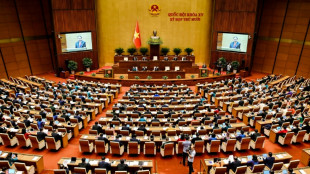

Indonesian shoemakers fear Trump tariffs despite lower levy
At a leather boot shop in the Indonesian city of Bandung, workers handle an order from Texas but owner Etnawati Melani says she fears such business will dwindle when Donald Trump's tariffs hit exports.
The United States is Indonesia's biggest market for footwear exports and the American president announced Tuesday he would impose 19 percent tolls on top of a baseline 10 percent for Southeast Asia's biggest economy.
The measure was lower than the initial extra 32 percent Trump threatened in April, and better than the 20 percent he imposed on Vietnam.
But Etnawati, who had plans to expand her business to the United States, said her focus would now shift to other markets.
"I have to develop a new strategy. Perhaps we have to diversify our markets, products, and so on. If it's possible to enter (the US market), but... not in large quantities at first, that's it," she told AFP.
"We can't rely solely on the US. There's still many markets in the world. We can still shift.
"I plan to shift focus to Japan and Russian partners."
In return for a lower tariff, Indonesia pledged billions to increase energy, agriculture and merchandise imports from the US and Trump said Jakarta had pledged to buy 50 Boeing jets.
It remains unclear when the new tariff rate Trump announced will come into effect and reaction from Indonesian officials has been muted while President Prabowo Subianto travels home from a Europe visit.
But chief negotiator Airlangga Hartarto, after meeting top US officials in Washington, said last week that the talks had been "positive".
Prabowo suggested after the initial tariff threat in April that Trump was maybe helping Jakarta by causing it to re-think its trade surplus with the world's top economy.
Data from the US Trade Representative office shows Washington's goods trade deficit with Indonesia was $17.9 billion in 2024, up 5.4 percent from the year before.
- 'I'm worried' -
Indonesia is the third-largest footwear exporter to the US behind China and Vietnam, according to the Observatory of Economic Complexity.
So any new tariff was likely to damage business -- particularly in Bandung, where its shoe scene is well-known internationally for beautifully hand-crafted quality leather boots.
Economists in Indonesia hit out at the deal with Washington, which Trump says would get tariff-free access in return.
"This is not an agreement. It's... a one-sided agreement," Jakarta-based Centre for Strategic and International Studies (CSIS) executive director Yose Rizal Damuri told AFP on Wednesday.
But he predicted American consumers would likely bear the costs more than Indonesian businesses, with Trump's tariffs sweeping across many countries.
"The United States itself will be the one more affected. Prices will rise," he said.
Data on Tuesday showed US inflation spiked in June as the tolls kicked on.
The shop's more seasoned workers such as Jajang -- who goes by one name -- have already experienced the ups and downs of business, with the Covid-19 pandemic hitting sales, and seeing dozens of colleagues laid off and several dying.
"I don't know about that issue, the important thing is that I work here," said the 53-year-old when asked about Trump's levies.
Others aware of the Trump threat to Indonesian exports were more concerned.
One of Etnawati's workers, Lili Suja'i, chipped away at a new set of boots for the three-pair Texan order -- riding boots, medium casual boots and loafers -- in a workshop adjacent to the store.
He said he feared US customers would be put off by higher costs, with the shop his main income for his family of three.
But the shoemakers are ready to fulfil any orders from Americans willing to pay the extra price.
"I'm worried, yes, but before placing an order, we negotiate the shipping costs and prices with the customer," the 38-year-old said.
"So, we've already made a deal. If they're OK with it, we'll do it."
D.Verheyen--JdB


